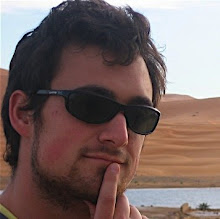This trip has comprised several markedly different "stages." There was the "blowing through Central America's Highlights" stage, the "camping with a crazy Dutchman" stage, and the "freezing my ass off to hike and sail at the End of the World" stage. Yet another stage has begun, and, for the first time on my trip, I feel like staying put. History will refer to this as the "farming, working with mud, and really going off the reservation" stage.
El Bolson blossomed with an influx of European and Argentine hippies in the 1970s. New Age homesteaders gobbled up plots of free land in this fertile valley, surrounded by snow-capped Andean peaks and traversed by the truly-blue Rio Azul. They created lives out of the land, making homes, making crafts, making cheese, making beer, making jam, making families. The town's Feria Artesanal became (and still is) a serious tourist draw and source of income, and I would guess that it indirectly or directly supports more than half of the town's 30,000 permanent residents (the population in Summer skyrockets to over 100,000 due to tourism).
I am currently volunteering for a local artisan and staying in the mud-walled hut/tool shed in his yard. Temperatures are consistently below freezing here, but a small wood-burning stove and a down comforter make the place comfy. I help him build mud ovens, plant trees, build greenhouses, and make windchimes in his workshop. He gives me food and a place to sleep and teaches me about everything he does. I usually eat lunch and dinner with the family and it's a rare day that I don't watch at least one episode of the Simpsons with the kids.
One of things that makes El Bolson so interesting is its heavy emphasis on local production, self-sufficiency, and community. Despite continued growth and commercialization, its lifeblood is the self-made craftsman. The town is full of transplants that arrived to try and make something out of nothing. Pastor, for example, showed up fifteen years ago as a 20-year old with no money and a baby on the way, and has made a name and a great living for himself out of the windchimes. He spent a substantial part of those fifteen years building two gorgeous houses by hand, progressing bit by bit only as time and money and help would allow. These type of people are used to making do with what they have and, most importantly, helping others. One community outside of town, for example, has a semi-formal system whereby the same group of people meet once every couple weeks to work on one of the group member's houses, rotating until all are finished.
The spirit of cooperation makes El Bolson a great learning environment. Many people rely on groups of friends and volunteers to do small and large-scale building projects and, even in the winter, help is always needed. Whatever the project, volunteers are incorporated in such a way that, rather than just working, they learn. In general, everyone here seems to be learning, whether about construction, knitting, farming, or websites. I have attended a course on seeds and a course on electricty, and last night a woman I met in the gas station invited me to come to her creative writing group later this week.
Pastor is part of a loosely-knit group of people, jokingly referred to as "the tribe," that are linked by a common interest in sustainable living. These are the folks that are developing off-the-grid communities outside of town with the the goal of self-sufficiency and cooperative living; the folks that build houses out of clay, sand, water, and cow shit; the folks that make windows out of broken windshields and wine bottles; the folks that treat toilet water with complex systems of rocks and water plants; the folks that, in the wake of the Argentine peso collapse in the early 2000s, created a local system of barter and trade divorced from government currency. Some of them also happen to believe that the world is, in some sense, going to end in 2012, and that giant energy-producing crystals occasionally come down from other galaxies, but, refreshingly, these ideas are not forced upon anyone.
I think that, like many people, the "crisis," as well as my particular experience on Wall Street, has prompted me to explore what it means to be happy, successful, and/or comfortable. To that end, getting to know "the tribe" and El Bolson, and the complete culture shock that entails, has been especially refreshing and rewarding. I am continually surprised at the way these people use a combination of creativity, enterprise, simplicity, efficiency, and patience to create wondrous things, whether it be homes or pieces of art or communities or lives, in the vague sense of the term. I am going to stay here a while and soak it all up, but, for the moment, I'll leave the neophyte's naive wonder at that.













Fantastic read, was last place i expected to learn about sustainable consumption, sounds like an interesting community you have fallen into my friend. Keep us all updated as genuinely interested in hearing more about El Bolson. The house actually is pretty impressive which i didnt expect to see. Tell Pastor i said hello jeje. Talk t ye later mate.
ReplyDelete